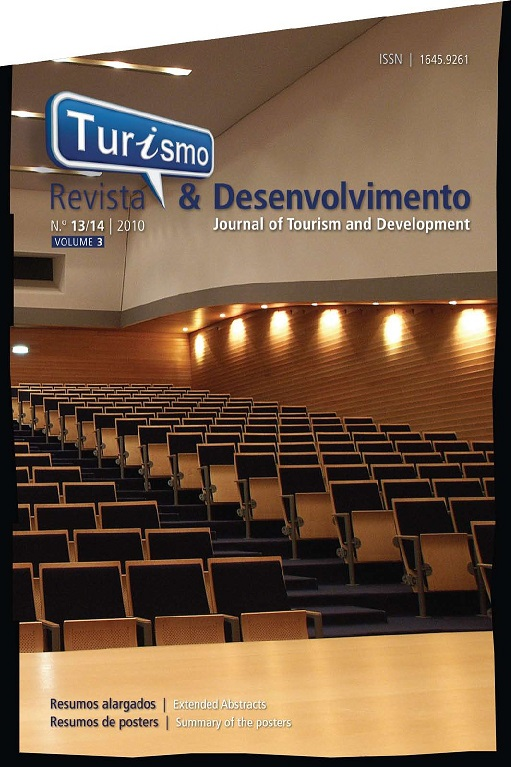Urban development and tourism in the mediterranean region: opportunities and strategies of european planning
Resumo
Objectives | In recent years tourism has become increasingly the object of interest related to the themes of sustainability and accountability. Sustainability and accountability are key themes and a central node of urban planning, drawing the attention of experts on the role of tourism as a potential territorial policy component which can interact with the different potential and critical development issues of the territory. The report presents two main research projects “AhlanWa Sahlan” and “SISLAB” undertaken by the Department of Urban and Regional Planning (DPTU) of the Faculty of Architecture “La Sapienza” University, proposed for the opportunities offered by European institutions for financing. The two research projects proposed for the Mediterranean area consider different points of view about tourism issues. The “Ahlan Wa Sahlan” project considers tourism as a potential component driving the regional policy to the recovery and development of tangible and intangible heritage of the historic urban centres involved. The “SISLAB” project highlights the problems related to mass tourism as an economic resource but also, and above all, as a serious problem threatening fragile environment and landscape, such as small Mediterranean islands subjected to tourism over pressure, sometimes unsustainable, during the tourist season peaks. The strategy proposed in the “AhlanWa Sahlan” project is focussed on the activation of recovery processes and exploitation of architectural heritage (housing) and fostering the economy through concerted actions and governance. The second search path “SISLAB” is aimed at the sustainable development of the territory through “green energy” experimental projects as local economic alternatives to tourism interacting with it in the planning and management process. In both europrojects the overall objectives are:
– increase the level of entrepreneurial cooperation among the different countries involved, as well as the collaboration between public administrations and the entrepreneurial sectors of the whole area;
– strengthen the informative and technological relationships between those responsible for culture, tourism and other sectors of the economic and social activities related to activities of tourism;
– promote tourism as an incentive to interpersonal and inter-cultural relationship among the peoples of the Mediterranean region;
– define strategies for the maintenance and exploitation of environmental, territorial and urban resources and autochthonous cultures, minimizing the effects of mass tourism.
Methodology | Based on the “learning by doing” methodology, the projects build a collective journey, based on cooperation among different sectors (cultural, social, business, entrepreneurship) and networking with civil society that proposes a Mediterranean Approach to local development, firmly secured on the role of education – in terms of cultural heritage, environment and city – and on the principles of equality and mutual understanding. In this difficult historical moment – marked also by the results induced by the global recession – it appears essential to claim a double function for tourism:
1. A factor for local development, as it envisages the re-territorialisation of the economy, reporting proceeds in the community that produces it;
2. A factor of social cohesion and cultural integration among the countries of the area, because it stimulates personal and cultural relations among different people.
Main results and contributions | Unfortunately, the development of mass tourism – produced in the Mediterranean from the 1960s onwards and based primarily on seasonal climatic offerings – has produced serious economic, cultural and environmental imbalances, some of which are irreversible. Progressively, however, contemporary society has become aware of the value of maintaining the environment and autochthonous cultures to the point that, today, any sustainable initiative related to the field of tourism in the Mediterranean region must contemplate the necessary measures to preserve its cultural and environmental heritage. In line with the geopolitical order of the Mediterranean, the partnership of both projects therefore believes that it is essential to:
– increase the level of entrepreneurial cooperation among the different countries involved, as well as the collaboration between public administrations and the entrepreneurial sectors of the whole area;
– strengthen the informative and technological relationships between those responsible for culture, tourism and other sectors of the economic and social activities related to activities of tourism;
– promote tourism as an incentive to interpersonal and inter-cultural relationship among the peoples of the Mediterranean region;
– define strategies for the maintenance and exploitation of environmental, territorial and urban resources and autochthonous cultures, minimizing the effects of mass tourism.
Limitations | The lack of a mutual understanding and cooperation between all those responsible for the projects and the local authorities, experts, technicians, citizens, etc.; the lack of collaboration with local authorities and their unwillingness to provide the necessary permits would prejudice the results of the projects; the lack interest, and consequent participation, by institutions, students, local citizens and actors in the projects.
Conclusions | The revitalization of urban areas and the heritage of related activities, together with the promotion of sustainable tourism, as it is known,can activate dynamics of economic sustainability and the reduction of social disparities that, besides opposing migratory phenomenon caused by unemployment, re-territorializes the economy and re-composes cultural identity, bringing the historical-cultural characteristics of local identities to the “centre” of the logics of territorial development and growth. In particular, investing in integrated relational tourism, creates a driving force for the systemic development, in a key of territorial sustainability, with specific reference to the cultural resources of anthropic and natural environment. It deals with a review of the very concept of tourism, understood as a promoter of interpersonal relationships and, at the same time, as an opportunity for territorial development through the planning of processes of exploitation, maintenance and recovery of manifold territorial realities capable of recounting the history of Mediterranean man through craftsmanship, agriculture and cultural heritage.





